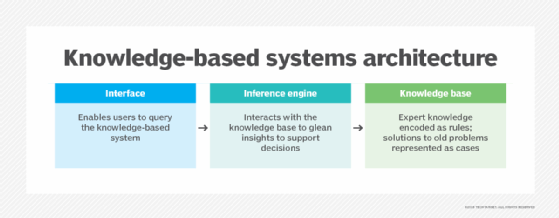
knowledge-based systems (KBSes)
What are knowledge-based systems?
Knowledge-based systems (KBSes) are computer programs that use a centralized repository of data known as a knowledge base to provide a method for problem-solving. Knowledge-based systems are a form of artificial intelligence (AI) designed to capture the knowledge of human experts to support decision-making. An expert system is an example of a knowledge-based system because it relies on human expertise.
KBSes can assist in decision-making, human learning and creating a companywide knowledge-sharing platform, for example. KBS can be used as a broad term, but these programs are generally distinguished by representing knowledge as a reasoning system to derive new knowledge.
A basic KBS works using a knowledge base and an interface engine. The knowledge base is a repository of data that contains a collection of information in a given field -- such as medical data. The inference engine processes and locates data based on requests, similar to a search engine. A reasoning system is used to draw conclusions from data provided and make decisions based on if-then rules, logic programming or constraint handling rules. Users interact with the system through a user interface.

What are knowledge-based systems used for?
Knowledge-based systems are commonly used to aid in solving complex problems and to support human learning. KBSes have been developed for numerous applications. For example, an early knowledge-based system, Mycin, was created to help doctors diagnose diseases. Healthcare has remained an important market for knowledge-based systems, which are now referred to as clinical decision support systems in the health sciences context.
This article is part of
A guide to artificial intelligence in the enterprise
Knowledge-based systems have also been used in applications as diverse as avalanche path analysis, industrial equipment fault diagnosis and cash management.
Knowledge-based systems and artificial intelligence
While a subset of artificial intelligence, classical knowledge-based systems differ in their approach to some of the newer developments in AI.
AI is organized in a top-down system that uses methods of statistical pattern detection such as big data, deep learning and data mining, for example. AI, in this sense, includes neural network systems which use deep learning and focus on pattern recognition problems such as facial recognition. By comparison, KBSes handle large amounts of unstructured data while integrating knowledge based on that data on a large scale.
Types of knowledge-based systems
Some example types of knowledge-based systems include the following:
- Blackboard systems. These systems enable multiple sources to input new information into a system to help create solutions to potential problems. Blackboard systems rely heavily on updates from human experts.
- Case-based systems. These systems use case-based reasoning to create solutions to a problem. This system works by reviewing past data of similar situations.
- Classification systems. These systems analyze different data to understand its classification status.
- Eligibility analysis systems. These systems are used to determine a user's eligibility for a specific service. A system asks a user guided questions until it receives a disqualifying answer.
- Expert systems. These are a common type of KBS that simulate human expert decision-making in a particular field. Expert systems provide solutions for problems as well as the explanations behind them. For example, they could be used for calculations and predictions.
- Intelligent tutoring systems. These systems are designed to support human learning and education. Intelligent tutoring systems provide users with instructions and give feedback based on performance or questions.
- Medical diagnosis systems. These systems help diagnose patients by inputting data or having a patient answer a series of questions. Based on the responses, the KBS identifies a diagnosis and makes recommendations medical professionals can use to determine a patient's treatment.
- Rule-based systems. These systems rely on human-specified rules to analyze or change data to reach a desired outcome. For example, rule-based systems might use if-then rules.
Advantages and challenges of knowledge-based systems
Knowledge-based systems offer the following benefits:
- Aid in expert decision-making, especially when a human expert isn't available.
- Provide efficient documentation for users to access quickly.
- Create new knowledge by referring to and reviewing existing stored data.
- Group data by analyzing and classifying different inputted data.
- Handle large amounts of structured and unstructured data.
- Improve decision-making processes, enabling users to work at higher levels of expertise.
However, the following are some potential challenges that come with these systems:
- Difficult to maintain, as some systems might require continual updating and organizational policies, or procedures might change and require updating over time.
- Potential anomalies such as circular dependencies or repetitive rules might appear in some systems.
- Require a large amount of accurate data.
- Require training for new users to understand the system.
- Some data could be considered abstract, making it difficult for a system to make decisions.
- The system's quality is only as high as the quality of data put into it.
There are numerous benefits to having a knowledge base, including team productivity and helping customers find answers to their questions. Learn how to create a knowledge base with these five products.






